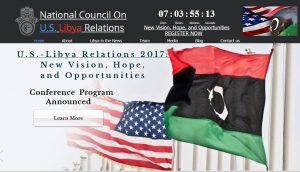By Libya Herald reporter.

Washington DC, 11 May 2017:
Libya should be more of a priority for the US, both in terms of helping address its immediate challenges but also harnessing the country’s potential in the long-term, former prime minister Mahmoud Jibril told a conference in Washington this week.
Coming amid speculation over what shape the Trump administration’s policy on Libya might take, the day-long conference organised by the National Council on US-Libya Relations, which describes itself as a non-profit educational organisation established last year, included a range of speakers on issues from the political crisis to security and the economy. Attendees included US officials, lobbyists and a range of business figures.
The conference was due to take place earlier this year but was postponed after the Trump administration’s travel ban made it difficult for Libyan participants to travel to the US. Earlier advertising for this week’s event featured National Oil Corporation chairman Mustafa Sanalla and Central Bank of Libya Governer Sadek Elkaber as key speakers but neither was able to attend.
Others including Presidency Council deputy chair Ali Gatrani, his former PC colleague Musa El Koni and former prime minister Ali Zeidan were also due to address the conference but did not make it.
Several speakers referred to Trump’s recent public comments that he did not see a role for the US in Libya beyond fighting Islamic State militants. Jibril argued that Washington should view Libya with a longer lens, seeing its potential as a future hub of development for the African continent, one which could also act as bridge for Europe.
Walid Phares, a Lebanese-American consultant who served as a Trump campaign adviser on the Middle East and north Africa last year, said that while the US president had stated he had no plan for Libya, “that can change”.
Phares said Trump’s forthcoming visit to the Middle East – during which he is scheduled to visit Saudi Arabia and Israel – along with his attendance at a NATO summit after that “could give him [and our Congress] a view that is more advanced regarding Libya” but he warned Libyans not to expect “dramatic changes”. Phares said more needed to be done to drum up-interest. “Understanding of Libya is limited in the US” – including the appointment of envoys.
Libya’s ambassador to Saudi Arabia Abdulbasit Elbadri, a close ally of Khalifa Haftar and an interlocutor for him with Russia, told the conference he hoped that the issue of greater US engagement with Libya would be raised during Trump’s visit to Riyadh.
In response to a question from the floor, Elbadri said it was not the case that Saudi Arabia was backing Haftar exclusively but, he argued, Riyadh’s view of the Libyan situation was coloured by its decision to designate the Muslim Brotherhood a terrorist organisation in 2014. Asked about the role of Saudi-linked Madkhali Salafists in Haftar’s camp – they have played a key role in his Operation Dignity since 2014 – Elbadri at first declined to answer the question then acknowledged they had fought for Haftar, describing it as “a matter of revenge”.
Elbadri also spoke about the recent meeting between Presidency Council head Fayez Serraj and Haftar in Abu Dhabi, which he said was the culmination of the “significant role” played by the UAE. He described the meeting as “amicable” but added that the discussions “did not go into details” contrary to reports in pro-Haftar media outlets. The objective of the Abu Dhabi meeting was, he said, not “in search of a political agreement or to [discuss] placing people in positions” but to reassure Libyans who are suffering due to the ongoing crisis.
In a later session on rebuilding the Libyan economy, Mohsen Derregia, former chairman of the Libyan Investment Authority, said any attempts to access Libya’s frozen funds should be rejected given the multiple rival entities currently claiming legitimacy in the country. Earlier this month at the Arab League, Fayez Serraj called for the release of funds that remain under UN sanctions in order to ease the economic crisis. “You will start a new civil war if you unfreeze those funds,” Derregia said.







